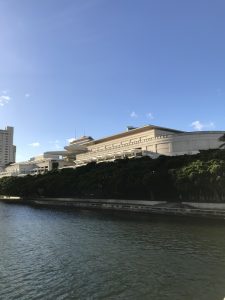Learning to be critically reflective is interdependent work. It requires a great deal of conversation, it requires faculty to be current in their fields, it requires discernment, and it requires questioning. It requires both independence and interdependence in learners and educators.
Post by Leslie Molnar, Instructor, College of the Rockies, 2018-19 Scholarly Teaching Fellow, BCcampus
Thanks to the BCcampus Scholarly Teaching Fellowship, I was fortunate to attend and present my academic research at the IAFOR (International Academic Forum) conference in Hawaii in January 2019. IAFOR was founded in 2009 in Japan to encourage interdisciplinary discussions and intercultural awareness through conferences and academic research; this year’s conference theme was Independence and Interdependence.
Close to 250 participants from over 40 countries attended the event at the Honolulu Conference Center. The first day of the conference consisted of keynotes, plenary sessions, and poster presentation sessions. The next two days consisted of seven parallel streams of 30-minute presentations organized into groups of three. The discussions and questions after each session were invaluable. I feel very lucky to have been exposed to such a variety of views from a variety of cultural perspectives. Rather than focusing on a particular session, I have compiled and integrated ideas from many workshop presenters and from the keynotes. The full conference proceedings can be found at: https://papers.iafor.org/proceedings/
Independence is key to post-secondary education. We, as teachers and researchers, need our academic freedom and the institutions where we work, teach, and learn need autonomy. Ever-changing technologies offer us new ways to encourage students to be self-directed. Readily available facts and resources allow us to tailor and curate content, enhancing the quality of our teaching and, consequently, the learning experience for our students.
Responsibility theory says it is, ultimately, up to our students to learn. As educators, we have the ability to encourage independent learning by sequencing the flow of information and learning outcomes. We can design the social context of learning to meet each learner’s need for autonomy, competence, and relatedness in our subject areas. We can show students what ‘good’ looks like in our particular discipline and then, based on that knowledge, they can judge their own work. Students can then be self-directed and confident in their choices regarding their own education.
We know learning is not just about the facts. Part of our job is to inspire excitement in our students, to motivate and encourage them to ask questions, to be mindful, to be non-judgmental, and to learn for themselves how to sort out what is important. Particular workshops talked about the value of motivational theory in education, of offering unique programming for students who are the first generation in their families to pursue post-secondary education, of incorporating cooperative learning strategies, of active learning activities, and of activities that promote respect for and interest in people from different cultural backgrounds.
One vision of the future is a world without classrooms and without classroom teachers. In this world, superstar lecturers would provide content knowledge to anyone with an internet connection. Individual tutors would work one-on-one with students, and engaging and high-quality apps would teach basic skills and knowledge such as multiplication tables in effective, interactive ways. Anyone could learn any subject, at any time, and in any place, should they make the individual choice to learn.
Now, compare and contrast that to the concept of interdependence. We do not educate or learn in vacuums. Contexts and constraints include families, cultures, available technologies, religions, as well as political and financial realities.
Many institutional mission statements mention transformational learning but, just as often, the actual programs offered are discipline silos and have no interdependence. If you isolate knowledge into discrete units, you diminish the ability of learners to see relationships. As our institutions continue to build and adapt areas of study, there should be more emphasis on the connections between disciplines.
In order to integrate knowledge, students must be able to connect skills and knowledge from multiple sources and experiences. Learners also need to be able to deal with diverse and contradictory points of view in our multicultural, disciplinarily-connected world. Learners and workers need the capacity to function effectively in multinational teams and settings. Problems are most often studied within disciplines, but it can be argued that interdisciplinary research questions can be wider reaching and more interesting. Often, distinct disciplines attract certain types of thinkers and employ discipline-specific research methods. By broadening teams, questions can be approached simultaneously from different angles and perspectives.

The ability to appreciate the arts and to evoke feelings is just as important as computer literacy. One workshop explained how
having new science teachers incorporate art, drawings, reflections, outdoor activities, and low-tech classroom environments in their science teaching resulted in students proactively engaging in problem-solving, coming up with creative, low-tech solutions, using more of their previous science knowledge, and vocalizing more in teacher-led discussions.
We underestimate the importance of interaction across sectors: academics, business
leaders, think tanks, unions, governments. Each sector tends to have its own terminology, its own rules of membership, and its own approach. Increased interdisciplinary communication can lead to shared vocabularies, shared understandings, and be a source of new ideas and perspectives.
Clearly, educational approaches need both independence and interdependence. Being able to sort out what is important, knowing how to use information resources, and possessing strategies to understand and employ global processes are necessary skills in the world today.
Acquisition of information is not the same as a critical approach to learning. Today’s global citizens need the ability to make sense of complex and seemingly contrasting pieces of information. They need social intelligence, the ability to employ novel and adaptive thinking, and cross-cultural competencies. Literacy in computational thinking, new media, cognitive load management, design principles, and virtual collaboration are also desirable.
All around the world, educators seem to be struggling with the tension between teaching traditional subject content and encouraging students to be self-directed. We are no longer preparing students for one career; re-educating oneself will be a normal part of life. How do we adapt higher education to reflect an interdependent world? One workshop on higher education in today’s world argued we are seriously lagging in our response to diverse modes of intelligence and learning methods, and that the traditional pedagogy of having a ‘major’ ignores the opportunity to truly integrate curricula. The structure of higher education needs be to re-envisioned, an enormous undertaking which should be taken on by a consortium of disciplines and should include students. We must challenge the notion that students need not contribute to what their teachers design for them to learn.
In higher education, we seem trapped by boxes: the physical rooms, the confines of class schedules, the finite amount of funding available, the quarterly semesters and 4-year degrees, and the ‘box of beliefs’ of some faculty that the only way to continue the study of a particular discipline is in the way they themselves were taught.
What is important to learn? How do we define ‘prepared for the next level’? How do we define ‘success’ at the next level? These are not questions which have static answers – they need to be part of a constant re-evaluation of our educational processes.

